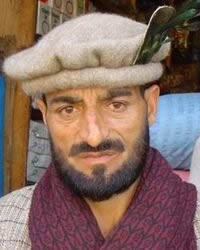Yashkun in Pakistan

Photo Source:
Copyrighted © 2026
International Mission Board-SBC - Hayden Bock All rights reserved. Used with permission |

Map Source:
People Group data: Omid. Map geography: UNESCO / GMI. Map Design: Joshua Project
|
| People Name: | Yashkun |
| Country: | Pakistan |
| 10/40 Window: | Yes |
| Population: | 2,000 |
| World Population: | 2,000 |
| Primary Language: | Balti |
| Primary Religion: | Islam |
| Christian Adherents: | 0.00 % |
| Evangelicals: | 0.00 % |
| Scripture: | Portions |
| Ministry Resources: | No |
| Jesus Film: | Yes |
| Audio Recordings: | Yes |
| People Cluster: | South Asia Muslim - other |
| Affinity Bloc: | South Asian Peoples |
| Progress Level: |
|
Introduction / History
The Yashkun are a small Muslim tribe who live in the high mountain valleys of north Pakistan. The original home of the Yashkuns is believed to be Central Asia. About the year 1000, the Buddhist and Hindu Yashkun became Sunni Muslims.
Where Are they Located?
The Yashkun tribe lives only in north Pakistan.
What Are Their Lives Like?
The Yashkun live much like their ancestors have for hundreds of years. Their chief occupation is that of raising sheep, cattle and goats. The Yashkuns migrate according to season. In the summer they take their animals to high mountain pastures. In the winter they live in lower elevations in huts along the banks of rivers. They obtain most of their food and clothing from their animals. In the short summers, they plant wheat, barley, corn, potatoes and vegetables to supplement their diet of meat and dairy products. They are suspicious of outsiders. Most Yashkun do not have access to modern medicine, electricity and indoor plumbing. Life expectancy is short in the cold, dry mountains of north Pakistan.
The Yashkun marry strictly within their group. Sons inherit their father's property with the eldest son becoming the head of the family. Families arrange marriages with the newly married couple living with or near the groom's parents.
The Yashkuns have often been victims of attacks from larger tribes like the Pashtuns. The larger groups would capture and enslave Yashkun women and children and steal Yashkun animals. Blood feuds are common among the peoples of north Pakistan.
Most Yashkun are unable to read and write. Yashkun children must often work to help support their families even if there are schools in the areas where they live. The main language of the Yashkun is Shina, a language spoken about half a million people in north Pakistan. Many Yashkun men also speak Pashtun. Only small Bible portions and some audio recordings are available in Shina. There are no known believers among the Yashkun.
What Are Their Beliefs?
The Yashkuns are entirely Sunni Muslim. The Yashkun mix their Islam with folk religion. The Yashkun try to obey the teachings of the Qur 'an and the prophet Muhammad. They believe that by following the Five Pillars of Islam that they will attain heaven when they die. Sunnis pray five times a day facing Mecca. They fast the month of Ramadan. The Yashkun try to attend mosque services on Friday if one is near. If a Muslim has the means, he or she will make a pilgrimage to Mecca once in his or her lifetime. Muslims are also prohibited to drink alcohol, eat pork, gamble, steal, use deceit, slander, and make idols.
The two main holidays for Sunni Muslims are Eid al Fitr, the breaking of the monthly fast and Eid al Adha, the celebration of Abraham's willingness to sacrifice his son to Allah.
What Are Their Needs?
The Yashkun have many needs including the needs of modern medicine and schools for their children. Most of all, the Yashkun need to hear and understand the life-changing message of Jesus Christ who alone can meet their deepest spiritual needs.
Prayer Points
Pray for gospel workers to catch a vision for reaching the Yashkun people of Pakistan.
Pray for Jesus movements to bless extended Yashkun families so the gospel will spread rapidly among this people group.
Pray for the spiritual lives of the Muslim Yashkun people to become fruitful as they follow Christ.
Pray for the lives and culture of the Yashkun people to evidence the rule and reign of the Kingdom of God as they open to the gospel, and for the beauty of Jesus to be seen in them.